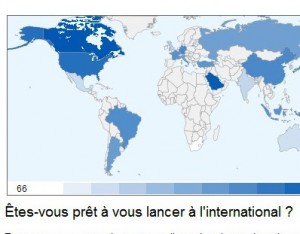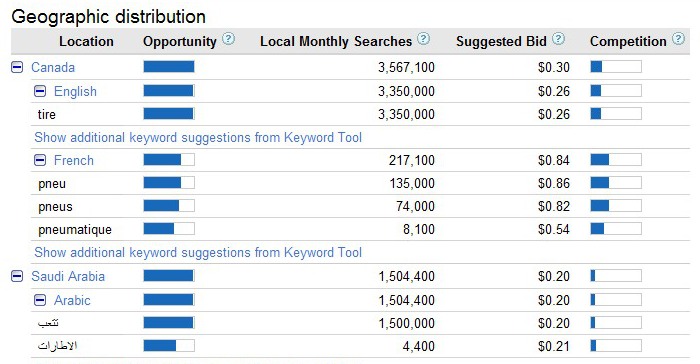 As the internet economy keeps on growing in a difficult economic outlook, business owners have the opportunity to search for new customers beyond their national frontiers. The easy access to websites have made the consumers in Europe, Asia, the Middle East, and South America a potential goldmine for marketers. The targeting of local consumers has become a major objective for most export oriented companies. While Google is indisputably the number one channel for search, and to generate sales leads, there are many other ways of searching on the internet.The emergence of social medias is starting to challenge the domination of the search market by Google. This market dynamic has given rise to internet marketing strategies like Geo targeting – which could be described as making your website visible to prospective consumers in foreign markets. Very few companies can afford to miss over half a billion potential online users of the European market if your online offers are only being seen in your local market.
As the internet economy keeps on growing in a difficult economic outlook, business owners have the opportunity to search for new customers beyond their national frontiers. The easy access to websites have made the consumers in Europe, Asia, the Middle East, and South America a potential goldmine for marketers. The targeting of local consumers has become a major objective for most export oriented companies. While Google is indisputably the number one channel for search, and to generate sales leads, there are many other ways of searching on the internet.The emergence of social medias is starting to challenge the domination of the search market by Google. This market dynamic has given rise to internet marketing strategies like Geo targeting – which could be described as making your website visible to prospective consumers in foreign markets. Very few companies can afford to miss over half a billion potential online users of the European market if your online offers are only being seen in your local market.
The new focus on international search marketing
Search Engines have still the major role in this frantic world of online persuasion. It is increasingly difficult for search engine optimizationspecialists and search engine copywriters to get the unknown products and services of their clients to the top of search engine results. The old idea of “if you build a website, your customers will come” is no longer applicable, especially in competitive international markets. Then, we should ask ourselves can we employ the same SEO strategy for Spain, France or Japan? Will it yield the same ROI or sales conversion?
First, we should deal with the issues of language and characters. Your organization could have similar web sites written in different languages for different targeted country. Of course, only large projects can afford having multiple versions of their website in multiple languages: But if you want to target the European market, it is important to recall that roughly 50% of online users in Europe are located in Germany, France, or the United Kingdom. So to reach out over half of European online users, we only have to localize the websites for English, German and French speakers.
But we should bear in mind that translation is not enough, and companies are often neglecting to take into account concepts of search marketing by not including the basics as part of their internationalization process. Web design companies often focus their efforts onclickability and usability factors by covering branding, look and feel, content generation and publishing.
However, equally important, the findability factors are left behind. Findability can be described as how easy it is for your potential customers community to find the content and resources they need to do their jobs. A global website will not be as successful, should proper methods of Search Engine Optimization, Information Architecture or even Paid Advertisement are not used when being built.
Websites need to be found on the first pages of Search Engines’ natural results or paid listings. Careful thought has to be given to keyword research, internal link structure, valid coding and other related subjects such as local backlinks that will influence the performance of a site. Having great content in the local language created by local translators considering cultural aspects is not enough if the text is not optimized with the most important keywords that people are searching for.
So, if we have to summarize, we would have to say that the most important factors in ranking well internationally (in order) would be:
1)Content of the website (keyword density, including the an address on each page with the name of country, name of city, language)
2)Local backlinks
3)Social networks
Take into acount the culture of search in the country you are targeting
The traditional marketers would agree that cultural aspects do play a significant role in marketing strategies of large corporations. On the internet, this also true. Regarding, content, for SEO implementation, one must deal with content writing and multimedia objects that enhance communication and conversion, taking into account the local culture.
Regarding the use of Search engines, this is also true. The importance of Google as a business channel is indisputable, but in some countries there are alternative search engines. In China, the local search engine is Baidu (with over 60% reach) – while Google captures roughly 25% of Chinese searchers.
So, while Google today plays a significant part in the developing of an internet marketing strategy, a good understanding of the local culture, language, and search behavior is paramount for success.
Using social networks to connect with your customers…
The face of social networks changed with the emergence of Facebook. However, even before Facebook, the cyberspace was reverberating with innovative social players like MySpace, LinkedIn, YouTube, or Flickr. Today, social network profiles are being used as corporate billboards to announce new products and services. We all know the value of consumption pattern and consumer psychology in marketing strategy, but it takes a huge effort to understanding the mindset of a consumer prior to the purchase. That’s where these social networks act as a bridge between buyers and the sellers. So, while business owners are busy on social networks connecting with potential customers, consumer behavior is also being extracted, providing a wealth of information for new business actions.
Today, proactive companies use social media to build long-term relationships and to establish communication between the customer, themselves, and the larger community. It is quite simple to use a social and business networking site such as LinkedIn.com to connect with your potential prospects in Asia, Europe, North America, and beyond. Yes, it is also true that many individuals and firms are able to conduct business in English. A multilingual website not only ensures a higher conversion rate but also create e better communication channel with your potential customers. However, imagine how your use of foreign languages, cultures, and symbols could substantially increase your chance of success.








 As the internet economy keeps on growing in a difficult economic outlook, business owners have the opportunity to search for new customers beyond their national frontiers. The easy access to websites have made the consumers in Europe, Asia, the Middle East, and South America a potential goldmine for marketers. The targeting of local consumers has become a major objective for most export oriented companies. While Google is indisputably the number one channel for search, and to generate sales leads, there are many other ways of searching on the internet.The emergence of social medias is starting to challenge the domination of the search market by Google. This market dynamic has given rise to internet marketing strategies like
As the internet economy keeps on growing in a difficult economic outlook, business owners have the opportunity to search for new customers beyond their national frontiers. The easy access to websites have made the consumers in Europe, Asia, the Middle East, and South America a potential goldmine for marketers. The targeting of local consumers has become a major objective for most export oriented companies. While Google is indisputably the number one channel for search, and to generate sales leads, there are many other ways of searching on the internet.The emergence of social medias is starting to challenge the domination of the search market by Google. This market dynamic has given rise to internet marketing strategies like